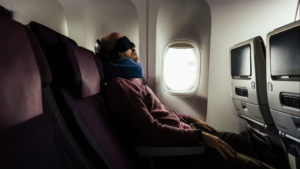Recently, a growing travel trend known as “raw-dogging” has captured the attention of social media users and health experts alike. This trend involves passengers enduring long flights without any in-flight entertainment, books, music, or even basic comforts like food and water. Advocates of this practice view it as a test of mental fortitude and resilience, while critics warn of its potential health risks.
Damion Bailey, a 34-year-old from Miami, Florida, recently boasted about his personal achievement of enduring a 13-and-a-half-hour flight from Shanghai to Dallas without any distractions. “It’s quite tough, honestly,” Bailey shared on Instagram, highlighting the challenge he sets for himself. Similarly, Australian music producer Torren Foot showcased his own experience on TikTok, describing a 15-hour flight to Melbourne with “no music, no movies, just flight map.”

This trend also sees some participants going to extremes, such as avoiding food, water, and even bathroom breaks. Manchester City footballer Erling Haaland recently joined the conversation, claiming he survived a seven-hour flight with “no phone, no sleep, no water, no food,” although his adherence to these self-imposed rules was questioned by some.
The appeal of “raw-dogging” seems to lie in its promise of proving one’s mental strength and ability to handle discomfort. For many, it offers a way to disconnect from the constant barrage of modern technology and reflect quietly. The term “raw-dogging,” which originally had a different connotation, has come to symbolize doing something without any external support or comfort.
However, health experts are raising alarms about the risks associated with this trend. Dr. Gill Jenkins, a GP and medical escort, criticizes the practice, noting that it disregards essential health precautions for long-haul flights. She warns that dehydration and prolonged immobility can lead to deep vein thrombosis, especially when combined with neglecting basic needs like using the restroom.
Conversely, some argue that embracing solitude and boredom during a flight can be beneficial. Business psychologist Danielle Haig suggests that “raw-dogging” reflects a broader desire for balance and mental clarity in a technology-driven world. She believes it allows individuals to reconnect with themselves and gain new perspectives.
Sandi Mann, an academic and author, also supports the idea of embracing boredom as a way to enhance relaxation and creativity. She acknowledges, however, that while limited stimulation can be good, it is crucial to balance this with practical health considerations. “Allowing yourself to be bored for a few hours is beneficial,” she says, but emphasizes that health risks should not be ignored.
The trend is not universally embraced. Critics describe it as “self-inflicted torture” and question the authenticity of claims made by participants. Some social media users have expressed disappointment, labeling the experience as overrated and mentally taxing.
In summary, while “raw-dogging” long flights might appeal to those seeking a test of personal endurance or a break from constant stimulation, it also presents significant health risks. Balancing the mental benefits with practical considerations remains crucial for anyone considering this trend.


















